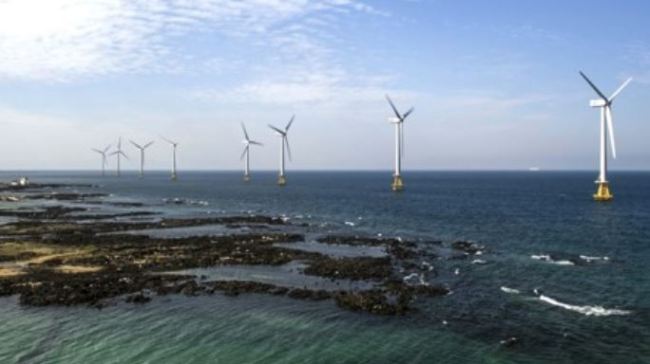South Korea will shift its reliance from coal and nuclear power toward renewable energy and natural gas to address environmental concerns and safety issues, the energy ministry said Thursday.
The Ministry of Trade, Industry and Energy announced its eighth basic plan for long-term electricity supply and demand in a meeting with a parliamentary committee, which includes an energy road map for 2017-2031.
"While past plans were set with a focus on a stable power supply and economic efficiency, the latest plan puts more emphasis on issues related to the environment and safety," the ministry said in a release. "When building new power plants, the government will reduce its heavy reliance on large nuclear power and coal plants, and put higher priority on renewable and liquefied natural gas plants."
The ministry said it will raise the ratio of renewable energy to 20 percent by 2030 by increasing investment in solar and wind power plants.

The new energy policy was designed to keep pace with the changing energy environment and growing safety concerns following the 2011 Fukushima nuclear disaster and a series of earthquakes stronger than magnitude 5 that hit the nation's southeastern region in 2016 and this year.
The government said it will take steps to close the Wolsong-1 reactor ahead of its operational schedule. The reactor's 30-year operational life cycle ended in 2012, but it was extended for another 10 years to 2022. It is now the nation's oldest reactor, following the permanent shutdown of Kori-1 in June.
"We will conduct an economic feasibility study on Wolsong-1 and after gathering opinions from the local community within the first half of 2018, decide the timing of its permanent shutdown," the ministry said. "We will take legal steps to request the nuclear regulator approve the change in the operational plan."
Under the nuclear phase-out plan, the nation's 10 oldest reactors will be retired by 2030 as their operational life cycles expire one by one. This will reduce the number of commercial reactors to 18 in 2018.
Currently, South Korea operates 24 nuclear reactors that generate about 30 percent of its electricity, while coal and renewable energy provide 37.5 percent and 6.2 percent, respectively.
The government also plans to shut down seven aged coal power plants and convert six coal projects to LNG plants to reduce carbon emissions.
While permitting the ongoing construction of power plants, facilities aged over 30 years will be prohibited from operating during the spring season when the nation chronically grapples with poor air quality caused by fine dust.
With the renewable energy push, the ministry said it aims to drive down greenhouse gas emissions by 26 percent from business-as-usual levels and cut fine dust levels by 62 percent by 2030.
The government said the new energy plan would not push up the electricity prices over the next five years and the technological advances in solar panel and other clean energy sources would drive down their production costs in the long term.
The ministry said it plans to hold a public hearing on Dec. 26 and an electricity policy committee will confirm the plan. (Yonhap)





![[Herald Interview] 'Amid aging population, Korea to invite more young professionals from overseas'](http://res.heraldm.com/phpwas/restmb_idxmake.php?idx=644&simg=/content/image/2024/04/24/20240424050844_0.jpg&u=20240424200058)











![[KH Explains] Korean shipbuilding stocks rally: Real growth or bubble?](http://res.heraldm.com/phpwas/restmb_idxmake.php?idx=652&simg=/content/image/2024/04/25/20240425050656_0.jpg&u=)

